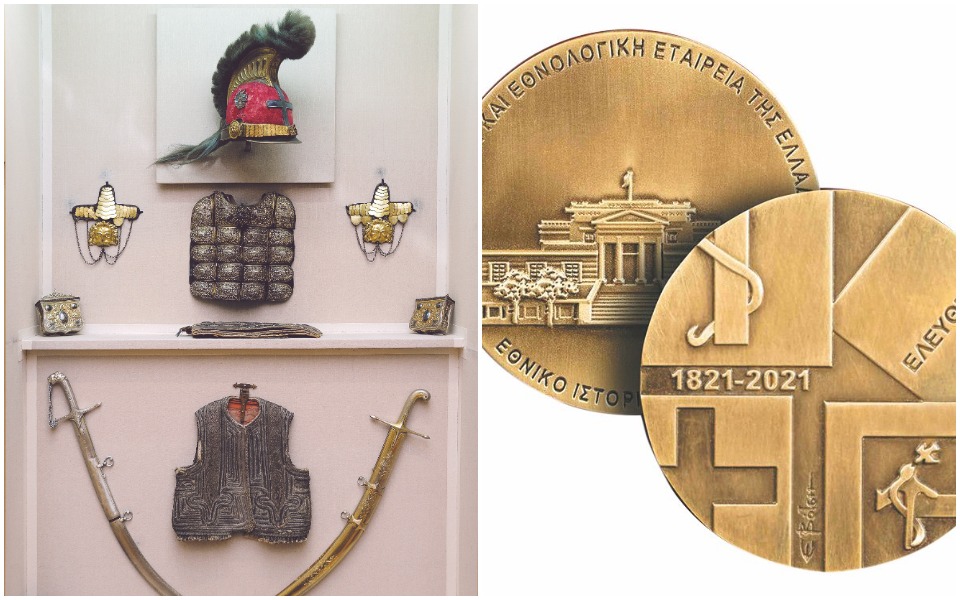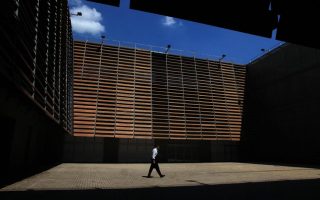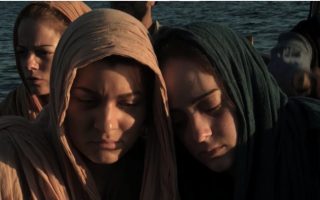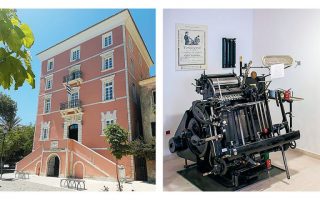Marking 1821 with rich program of events
Events from the organization’s cultural center include lectures, exhibitions and other events in Athens and beyond on the Greek Revolution

While their country faced a deep financial crisis from early 2009 to late 2018, an increasing number of Greek historians started seeking out the truths buried in their history and the milestone that is the 1821 Greek War of Independence. Their aim was to point out and look past the comfortable misconceptions that had been created and it was during this effort that a new core audience was created that attended lectures in Athens and further afield.
In this second crisis we face, this time a pandemic, just before the bicentennial celebrations of the Greek War of Independence, interest in the topic continues unabated. The online lecture series “21 Lectures on ‘21,” which features many specialists from the University of Athens and is moderated by historian Maria Efthymiou, takes place every Wednesday at 7 p.m., with an increasing number of attendees since the series launched on January 13. The first four online lectures each had between 600 and 1,000 direct participants on the video conferencing Webex platform, while on YouTube the lectures have racked up over 14,000 views.
This series of lectures is part of a wider initiative celebrating 1821 organized by Piraeus Bank. This major project seeks to encompass academic research, cultural events, as well as artistic and literary events, with the participation of many major institutions and experts. Its purpose is to highlight the various struggles for independence by the Greeks but also to examine Greece’s 200 years of statehood. Other events of this multifaceted initiative include an international conference on the bicentennial of the Greek War of Independence organized by the University of Athens that will take place in March, the academic symposium “Views on Everyday Life in Revolutionary Greece” and the resulting publication, and a series of 11 seminars titled “200 Years of Greece: Reflections and Prospects.”
The chairman of the board at Piraeus Bank, George Handjinicolaou, stresses that “this 200-year milestone of the free Greek state is a historic moment for reflection, introspection, reappraisal and reinterpretation of the most important events of this great but troubled journey utilizing a more modern and detached approach. This is the journey that led us to the Greece of today.” The bank’s chief executive officer, Christos Megalou, notes that through this initiative, “we support primary source research, academic institutions and Greece’s young academics. We support research carried out both in Greek and international archives, work that enriches our understanding of the time and makes it accessible to a wide audience. At the same time, we look back to the legacy of the struggle, both material and spiritual, and seek to reappraise it from a more contemporary viewpoint.”
The Historical and Ethnological Society of Greece, which established the National Historical Museum, is also participating in the bicentenary celebrations with its “Re-Constitution 21” initiative. This includes the release of a collectible bronze medal designed by Elena Votsi and a floating exhibition highlighting the naval battles of the War of Independence. A sailing boat, gifted by the Maria Tsakos Foundation, will host this exhibition as it sails across the Aegean. It will be docking at all the islands that helped shaped the Greek maritime effort as well as the country’s more remote islands. The exhibition will include heirlooms from the war as well as digital educational presentations. The floating exhibition will stop at Chios, the location of the Mastic Museum of the Piraeus Bank Group Cultural Foundation, before returning to Athens after a tour of the northeast Aegean. Piraeus Bank and its Cultural Foundation will also collaborate with the National Historical Museum to put on two temporary exhibitions. They will be set up at the Silversmithing Museum in Ioannina and the Open-Air Hydropower Museum in Dimitsana and will display a wealth of important heirlooms and archival material. In Ioannina, visitors will be able to see the dress of Kyra Frosini, who was executed by the local Ottoman governor Ali Pasha. Visitors will also be able to see Ali Pasha’s musket and a manuscript of Greek hero Markos Botsaris, among other items. In Dimitsana, the exhibition will feature the epaulettes and ring of Theodoros Kolokotronis, relics from Patriarch Gregory V (born in Dimitsana and executed in Constantinople at the outbreak of the revolution), as well as pistols and muskets belonging to the military captain Nikitaras, among others. The exhibition “1821 Done Differently: The Greek War of Independence Portrayed with Playmobil Dioramas and Figurines,” meanwhile, has moved from the Museum of the Olive and Olive Oil in Sparta to the Industrial Olive Oil Production on Lesvos. It will later move to the Rooftile and Brickworks Museum in Volos. However, as museums remain closed, it can also be viewed online at www.eleftheroi.gr.
The nine participating museums of the Piraeus Bank Group Cultural Foundation, its Historical Archives building in Athens, and a theater in New York will all host the play “The Society of Friends: The Brotherhood Behind the Revolution.” It is directed by Ioli Andreadi, who along with Aris Asproulis has conducted archival research into the era and curated the script. For younger audiences, Sofia Kalantzakou has written a story about Dimitsana and its role in the production of gunpowder. Finally, it should be noted that Piraeus Bank and two secretariats of Greece’s Foreign Ministry, those of Public Diplomacy and Greeks Abroad, signed a memorandum of cooperation in July 2020. They agreed to encourage members of the Greek diaspora to join the celebrations by bringing these events to their communities.
Original manuscripts
Who among us would not be interested in seeing the documents of the Greek War of Independence stored in the General State Archives? The publication “1821 and its Protagonists” includes, among others, missives and manuscripts written by participants in the struggle for liberation and documentary evidence of the revolution’s preparations. At the same time, the academic publication “French New Bulletins, 1821-1822” will provide readers with insights into a different point of view, with reports by Emmanuel Halgan, commander of the Levant division of the French Navy, on the revolution’s first year and its geopolitical ramifications. His reports were hitherto unknown to Greek audiences.
Further standout publications include “Agriculture in Greece: 200 Years of History – Future Challenges and Opportunities” by the scientific team of the Agricultural University of Athens, an anthology of poems published in collaboration with the Takis Sinopoulos Modern Greek Poetry Education Center, and a pocketbook edition of Dionysios Solomos’ poem “Hymn to Liberty,” along with woodblock prints of the 1821 participants by Yiannis Psychopedis.
The shared production of “Despo,” an opera by Pavlos Carrer, and Nikos Skalkottas’ “Greek Dances” performance that will be hosted by the National Opera of Greece will also be supported by Piraeus Bank. The bank will further be supporting the exhibition “Ec-Stasy: Attempts in Portraying Liberty” organized by the Cultural Foundation of Tinos and the Corfu Heritage Foundation.
Price of freedom
In charge of Piraeus Bank’s cultural and social activities is Angeliki Bouki. In an interview with Kathimerini she revealed that the basic pillar of the bank’s initiative is “the universal message of the Greek War of Independence and the historical context that unsheathed Greek passion to break free of Ottoman rule, the impact on the revolution of the European Enlightenment, and the founding and actions of the Society of Friends. It will also seek to highlight the contribution of intellectuals of the Greek diaspora and the influential movement of Philhellenism to the success of the struggle, the heroism and self-sacrifice of the participants in the War of Independence in the unequal fight against the powerful Ottoman Empire, while also promoting beneficial suggestions for the future of Greek society and its endeavors.”
Bouki describes the initiative as “celebratory, educational and in support of academic research,” while stressing that it is “a tribute to those who revolted and challenged the Ottoman Empire to achieve liberty.” At the same time, she believes that it will achieve the “dissemination of historical knowledge to a wider audience, whether they are still in education or not.” She also believes that the initiative will be successful in “supporting the academic and research community in achieving its goals and highlighting new sources and interpretations of the Greek War of Independence.” Bouki says that “1821 is the historic moment where we find both the final formation of Greece’s national identity and the birth of the modern Greek state.” However, she also mentions that the initiative emphasizes “the proper evaluation of the historiography of the Greek War of Independence beyond stereotypes and dogmatic interpretations.” When we ask her what she hopes the lasting legacy of the initiative on Greek society will be, she replies, “An understanding of the history of the Greek War of Independence, and that it acts as a reminder that liberty is the highest virtue and that attaining and maintaining it requires sacrifices and a struggle.”





